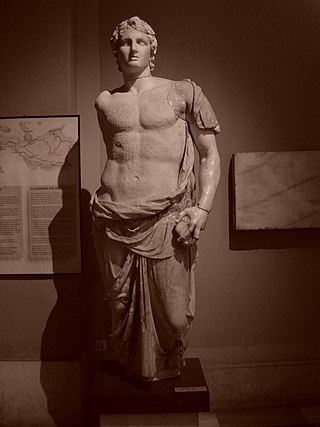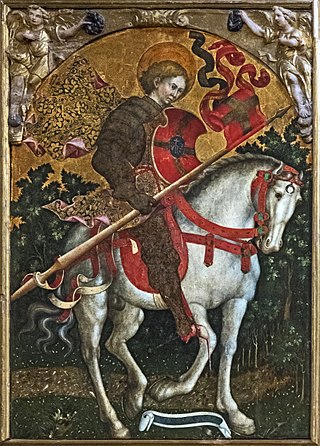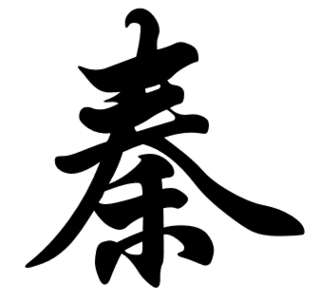
Alexander is a male given name. The most prominent bearer of the name is Alexander the Great, the king of the Ancient Greek kingdom of Macedonia who created one of the largest empires in ancient history.
Andronicus or Andronikos is a classical Greek name. The name has the sense of "male victor, warrior". Its female counterpart is Andronikè (Ἀνδρονίκη). Notable bearers of the name include:
Apollodorus was a popular name in ancient Greece. It is the masculine gender of a noun compounded from Apollo, the deity, and doron, "gift"; that is, "Gift of Apollo." It may refer to:
Achaeus is a masculine given name. It may refer to:
Berenice is the Ancient Macedonian form of the Attic Greek name Φερενίκη Pherenikē, which means "bearer of victory" from Ancient Greek φέρω (pherō) 'to bear', and νίκη (nikē) 'victory'. Berenika, priestess of Demeter in Lete ca. 350 BC, is the oldest epigraphical evidence. The name also has the form Bernice.
Eochaid or Eochaidh is a popular medieval Irish and Scottish Gaelic name deriving from Old Irish ech, horse, borne by a variety of historical and legendary figures.
Valerius Flaccus is the name of:
Theaetetus (Θεαίτητος) is a Greek name which could refer to:

Timotheus is a masculine male name. It is a latinized version of the Greek name Τιμόθεος (Timόtheos) meaning "one who honours God", from τιμή "honour" and θεός "god". The English version Timothy is a common name in several countries.
Lucius Cornelius Chrysogonus was a Greek freedman of Lucius Cornelius Sulla whom Sulla put in charge of the proscriptions of 82 BC. He purchased the property of the proscribed Sextus Roscius Amerinus, worth 250 talents, for 2,000 denarii. Chrysogonus then accused Roscius's son, Sextus Roscius, of murdering his father. In 80 BC Chrysogonus was in turn accused of corruption by Marcus Tullius Cicero, who was defending Sextus Roscius during his trial. Very little is known of Chrysogonus after the trial.

Saint Chrysogonus is a saint and martyr of ancient Rome venerated by the Catholic Church and the Eastern Orthodox Church.

Qín (秦) is a common Chinese surname. "Qin" is the hanyu pinyin romanization of the surname for Mandarin, the common dialect of China; other romanizations of the surname include Chin and Jin in Mandarin, Ceon and Cheun in Cantonese, and Tần in Vietnamese. People with this surname are most commonly found in Henan, Shaanxi, Shandong, Sichuan, Hubei and Hebei. It is the 18th name on the Hundred Family Surnames poem.
Sextus Roscius was a Roman citizen farmer from Ameria during the latter days of the Roman Republic. In 80 BC, he was tried in Rome for patricide, and was successfully defended by the 27-year-old Cicero in the extant Pro Roscio Amerino, Cicero's first major litigation. The case involved some risk for Cicero, since he accused Lucius Cornelius Chrysogonus, a freedman of Sulla, the former dictator of Rome, of corruption and involvement in the crime.
Samus or Samius or Simmias, son of Chrysogonus was a Macedonian lyric and epigrammatic poet. He was brought up with Philip V, the son of Demetrius, by whom also he was put to death, but for what reason we are not informed. He therefore flourished at the end of the 3rd century BC. Polybius has preserved one of his iambic lines ; and two epigrams by him are contained in the Greek Anthology, both on the subject of Philip's exploit in killing the wild bull on Mount Orbelos, on which we have also an epigram by Antipater of Sidon. The name is written in both the above ways, and in the Planudean Anthology both epigrams are ascribed to Simmias doubtless by the common error of substituting a well-known name for one less known.
Chrysogonus was a close friend and military general of the Macedonian king Philip V. He is recorded as coming from Edessa and was likely from a Macedonian noble family. Chrysogonus was employed both in war and in peace, and possessed great influence with the King, which he seems to have exercised in an honourable manner, for the Greek historian Polybius says that Philip was most merciful when he followed his advice. His two sons, Pyrrhichos and the court poet Samus, were executed by Philip in 183 BC as conspirators against the king.
Chrysogonus (Χρυσόγονος) was a celebrated Athenian flute player, who dressed in a sacred robe pythike stole played to keep the rowers in time, when Alcibiades made his triumphal entry into the Piraeus on his return from banishment in 407 BC. From a conversation between the father of Chrysogonus and Stratonicus, reported by Athenaeus, it seems that Chrysogonus had a brother who was a dramatic poet. Chrysogonus himself was the author of a poem or drama entitled Politeia, which some attributed to Epicharmus.

Pro Roscio Amerino is a defence speech given by Marcus Tullius Cicero on behalf of Sextus Roscius, a Roman citizen from the municipality of Amelia accused of murdering his father. Delivered in 80 BC, it was Cicero's first major public case. It is also his second-earliest surviving speech.
This page is based on this
Wikipedia article Text is available under the
CC BY-SA 4.0 license; additional terms may apply.
Images, videos and audio are available under their respective licenses.




